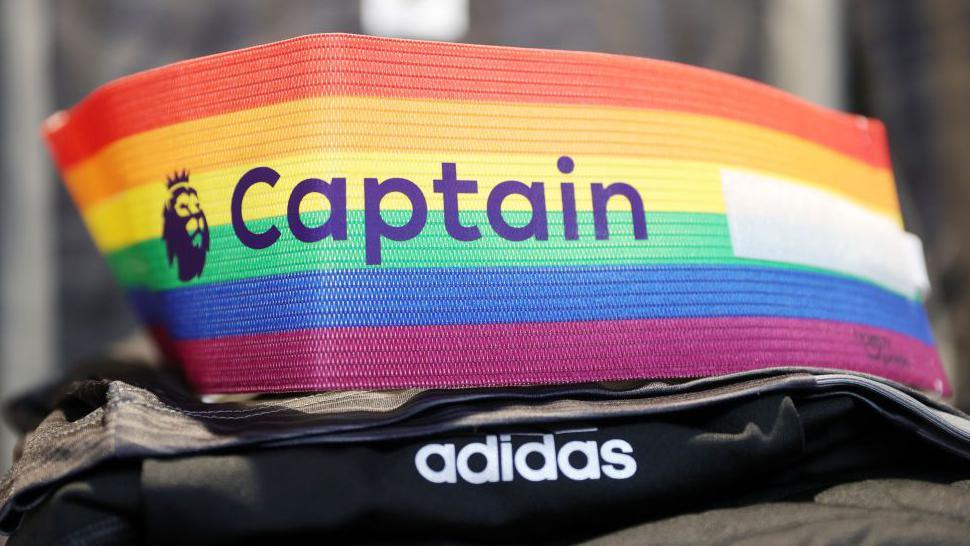Premier League ends partnership with Stonewall

Nineteen out of 20 Premier League captains wore the rainbow armband last season
- Published
The Premier League will no longer take part in the Rainbow Laces campaign after ending its partnership with LGBTQ+ charity Stonewall.
The charity and the Premier League began working together in 2014 to "help further promote LGBT+ equality in football".
As first reported by the Daily Telegraph,, external the Premier League now plans to launch its own inclusion campaign to coincide with LGBTQ+ History Month in February.
Sources have told BBC Sport that the Premier League is continuing to work with clubs to reinforce the message that discrimination will not be tolerated and that existing education resources remain available.
"Rainbow Laces has benefited from a wide range of partners with a natural ebb and flow reflecting cultural and sporting changes," a Stonewall spokesperson said.
"Alongside other sporting bodies the FA has been instrumental in advancing LGBTQ+ inclusion at the grassroots level and more recently the Women's Super League has taken up the mantle as the women's game has grown - enabling Rainbow Laces to reach more diverse audiences."
Stonewall's Rainbow Laces campaign, which launched in 2013, was supported by all clubs in England's top flight.
The initiative encouraged all Premier League players to wear rainbow-coloured laces and captains rainbow armbands to show support for the rights of LGBTQ+ people, inspire acceptance among children and young people, and promote equality and diversity.
Ipswich captain Sam Morsy, a Muslim, decided not to wear the rainbow armband last season, with the club saying it was because of his "religious beliefs".
Crystal Palace's Marc Guehi wrote 'I [heart] Jesus' across his armband, while Manchester United abandoned plans to wear a jacket supporting the LGBTQ+ community because a player refused to wear it.
Meanwhile, Premier League players have agreed to continue taking the knee in 2025-26.
But they will perform the gesture, which is linked to the Premier League's "No Room for Racism" campaign, on just two occasions during October's Black History Month.
It comes after the England women's team announced they would stop taking the knee.
Many prominent organisations have ended their association with Stonewall in the last few years.
In 2021, the BBC withdrew from a workplace equality scheme run by Stonewall because of questions over whether it could be impartial on issues that the charity was campaigning about.
Campaigners will be watching - analysis
Josh Parry, LGBT & Identity Reporter, BBC News
The Rainbow Laces campaign quickly became a prominent symbol of inclusion for LGBTQ+ sports fans.
Within just a few years of its launch, it was adopted by the top flight of football - a move which drew praise from equality campaigners around the world.
But in the eight years since the Premier League became involved, there's been a huge amount of public debate about the work of diversity, equity and inclusion (DEI) initiatives, both in sport and in wider public life.
The move away from Stonewall is likely to add more fuel to that debate - and there will be a lot of scrutiny about the reported plans for the Premier League's own inclusion campaign.
Given the state of play - with no openly gay or bisexual players currently in the Premier League, and the recent Home Office statistics showing a rise in homophobic incidents at matches - campaigners will likely be watching closely to make sure this isn't an own goal.
Related topics
- Published31 January
